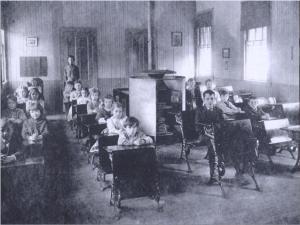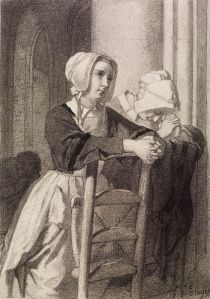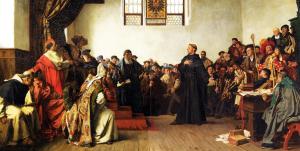The “TBB” in the name of this post means that it is part of The Big Box series. If you’re new to Scarlet Letters, read the introductory post to see what the Big Box is all about.
It seemed appropriate, after four weeks of parenting lectures by S. M. Davis, to look at this lecture by Doug Phillips about the role of children in FIC churches. There’s not much to say in the way of introduction this week, so let’s jump right in since the first section is largely review anyway.
In terms of completeness only, Phillips did much better than the other lecturers in the Big Box who talked about Sunday School (see here and here): he actually mentioned the founder of the Sunday School movement, Robert Raikes, by name, and even more crucially, provided dates. I pointed out in an earlier post that it’s impossible to tie the early Sunday School movement to Darwinism, as it predated The Origin of Species by several decades. Phillips actually tacitly admits this in The Role of Children, and says that the Sunday School movement began as a well-intentioned effort. He quickly leaves that topic, however, and moves on the usual rant against Darwinism and how it (supposedly) gave rise to age-segregation. Thus, the promising discussion of the pre-Darwinist roots of Sunday school is still swamped by anti-Darwin rhetoric, so it’s easy to miss that Phillips’ entire historical argument is incorrectly timed (and Phillips himself doesn’t seem to care).
More interesting than the above rehash of the Sunday School movement, however, is the flat-out self-contradiction Phillips spouted when discussing the New Testament church (emphasis mine):
The idea of setting up separate schools for little children, the idea of delegating the training of our children away to other people, was something that was unheard of and unthinkable. It was the responsibility of families to train their children, and fathers in particular, and it was the responsibility of families to come together and worship as families. Well, a lot of this changed with the rise of Constantine and the growth of the Roman approach to church, where no longer were fathers responsible in the meeting of the church, now you had priests, who were unmarried men who took greater responsibility, and the emphasis on family-based worship began to be changed a little bit to an individualistic form of worship.
 A straightforward reading of the above paragraph makes it sound as though age-segregation did not exist in New Testament times. Compare this, however, to Phillips’ statement in an earlier lecture, 6,000 Years of Earth History in One Hour (emphasis mine):
A straightforward reading of the above paragraph makes it sound as though age-segregation did not exist in New Testament times. Compare this, however, to Phillips’ statement in an earlier lecture, 6,000 Years of Earth History in One Hour (emphasis mine):
Those Hebrew fathers, who had walked alongside their sons for millennium past, who had asked their sons questions, who had disciple their sons and their daughters, had adopted the educational system of the Greco-Romans. Did you know that? Did you know that it was during this time period that we had temple education systems built and school systems built for the first time? This time period. So it’s wonder when Jesus Christ said, when I come, when John the Baptist comes to herald Me, here’s what’s gonna happen. Those children, whose hearts have been turned away from Me, are gonna turn back towards Me. Fathers are gonna re-embrace their responsibilities. The promises of God are going to be renewed. Families are gonna take this seriously again. And thus the hearts of these parents are gonna be turned back to their children.
In context, Phillips is claiming that Jews immediately prior to the time of Christ set up schools for their children (see my review of 6,000 Years for more detail), and that one of the purposes of the Incarnation was to abolish these schools. Phillips, however, can’t logically affirm both this paragraph and the one from The Role of Children. Were there schools, or weren’t there? What exactly were these Jews doing if schools for children were “unheard of and unthinkable” in the first century? Perhaps he could wiggle out of this and claim that they were only “unheard of and unthinkable” among first-century Christians, but a huge number of those Christians started out as Jews. Does he seriously think they’d never heard of these schools? That is what the phrase “unheard of” means, after all. So in the end, no amount of spinning can fix this, and we’re left wondering which Doug Phillips we should believe.
Hold your tongue
Immediately after claiming that Constantine and the Catholic church wrecked family-centered worship, Phillips says this:
You see, in the Biblical pattern, the men actually participated in the meeting of the church. We find out in the book of Acts, for example, that every man came with a psalm, with a word, with a prophecy. He came to speak to [sic] the word of God and to raise his voice in song, to pray before the congregation, and these were the families that came together under the leadership of fathers.
Phillips is actually alluding here to this verse from 1 Corinthians 14:
How is it then, brethren? Whenever you come together, each of you has a psalm, has a teaching, has a tongue, has a revelation, has an interpretation. Let all things be done for edification. (1 Cor. 14:26)
It’s clear from the quote above that Phillips believes this verse applies only to men, probably because it’s followed only a few lines later by this infamous passage:
Let your women keep silent in the churches, for they are not permitted to speak; but they are to be submissive, as the law also says. And if they want to learn something, let them ask their own husbands at home; for it is shameful for women to speak in church. (1 Cor. 14:34-35)
 It would be a gross understatement to say that debate has raged over this passage for years. For our purposes here, it’s enough to point out that even most conservative complementarians do not interpret it to mean that women cannot speak at all during a church service, as Phillips apparently does. This is mostly because 1 Corinthians 11 appears to flatly contradict 1 Corinthians 14:
It would be a gross understatement to say that debate has raged over this passage for years. For our purposes here, it’s enough to point out that even most conservative complementarians do not interpret it to mean that women cannot speak at all during a church service, as Phillips apparently does. This is mostly because 1 Corinthians 11 appears to flatly contradict 1 Corinthians 14:
Every man praying or prophesying, having his head covered, dishonors his head. But every woman who prays or prophesies with her head uncovered dishonors her head, for that is one and the same as if her head were shaved. … Judge among yourselves. Is it proper for a woman to pray to God with her head uncovered? (1 Cor. 11:4-5, 13)
1 Corinthians 11 comes with a slew of its own interpretive and contextual difficulties (see here for just one example). But one thing that is not up for debate, is that the women in question can pray and prophesy in the church meeting. If they could not, then Paul’s entire argument about head coverings would have been a waste of ink, paper and time, and he could have simply written, “Women shouldn’t talk in church at all, covered or not.” Thus why even most complementarians allow 1 Corinthians 11 to interpret 1 Corinthians 14, and not the other way around.
What this all adds up to, of course, is that Phillips’ picture above of only men participating in early church services, is likely a complete fantasy. What’s also left unclear here is whether children can speak in church. John Thompson, who delivered one of the earlier lectures on the FIC, does not allow this before age 13. I can’t confirm whether Phillips agrees with this or not. I will note, however, that I don’t recall him mentioning children actually participating in the church service; he mostly only talked about them learning passively via hearing.
Another question that arose in my mind while listening to this lecture, was that of gender-segregated ministry. Phillips complains frequently that age-segregated ministries “divide the family” in an unnatural and unbiblical manner. So I want to know, what does he think of gender-segregated ministry? It’s not uncommon for churches to have men’s groups and women’s Bible studies; are these bad too? In fact, until it recently closed, Vision Forum Ministries itself promoted groups like the Christian Men and Boys’ Titanic Society. Where is the Christian Women and Girls’ Titanic Society? And isn’t all this just another form of “dividing the family,” only by gender instead of age? If not, what’s the difference? Why is it holy and godly to gender-segregate, but sinful and pagan to age-segregate?
Life in the Reformed box
Throughout the lecture, Phillips made several statements that reveal both his double standards and his total misunderstanding of churches that don’t fit his conservative Reformed assumptions. Take, for instance, his statement above about the Catholic church:
Well, a lot of this changed with the rise of Constantine and the growth of the Roman approach to church, where no longer were fathers responsible in the meeting of the church, now you had priests, who were unmarried men who took greater responsibility, and the emphasis on family-based worship began to be changed a little bit to an individualistic form of worship.
Now no one denies that the official establishment of Christianity under Constantine produced huge changes in the church, and that the effects of those changes are still being felt and debated today, but that’s a topic far beyond the scope of this article. What I’d like to know is, what does Phillips think is so “individualistic” about Catholic worship? Has he ever been to Mass? If he has, did he miss that the entire service is essentially corporate – in fact, that all liturgy is essentially corporate (liturgy does mean something along the lines of “work of the people” or “public work”)? What is “individualistic” about that? Also, if it’s the liturgy Phillips thinks is “individualistic,” then he’s tarring Lutherans, Episcopalians and the Orthodox with his broadbrush too. I’m honestly totally confused by this, and wish Phillips would have clarified what he meant here. As it is, he comes off as profoundly clueless, and maybe even willfully ignorant, about liturgical churches.
Phillips also repeats several times that family worship was revived during the Reformation. This is probably true to some extent, but the overall impression left (at least to this listener) is the Catholic church somehow values families and children less than Protestant churches. This is just wrong, as anyone with even the slightest exposure to Catholic beliefs about birth control knows (and of course we can’t forget Pope Francis!). In fact, though Phillips may not be aware of this, he and his patriarchal Quiverfull comrades practice and believe many of the same things as certain conservative Catholics (see here, here and here), though they reached their conclusions by different methods.
 I also think Phillips may need a reminder that the Reformation did not begin and end with the Reformed church. In this and other lectures, when he talks about the Reformation, he repeatedly references the Westminster Confession; talks a lot about the Puritans, John Knox, John Calvin and other Reformed giants; and seems especially obsessed with the Reformation in Scotland (which gave us Presbyterianism). That’s fine, and it became clear in the very first post of this series that Phillips was Calvinist so it’s only to be expected. However, he cannot take these things and refer to them as “the Reformation,” as if they were the entirety of that movement. Many different schools of thought (Lutheranism, Anglicanism, Anabaptism, etc.) emerged during the Reformation; Calvinism is only one of them. Phillips may disagree with the others, but that doesn’t mean they weren’t part of the Reformation. In other words, the Reformation and reformers do not automatically equal Reformed, just because the words all share the same root.
I also think Phillips may need a reminder that the Reformation did not begin and end with the Reformed church. In this and other lectures, when he talks about the Reformation, he repeatedly references the Westminster Confession; talks a lot about the Puritans, John Knox, John Calvin and other Reformed giants; and seems especially obsessed with the Reformation in Scotland (which gave us Presbyterianism). That’s fine, and it became clear in the very first post of this series that Phillips was Calvinist so it’s only to be expected. However, he cannot take these things and refer to them as “the Reformation,” as if they were the entirety of that movement. Many different schools of thought (Lutheranism, Anglicanism, Anabaptism, etc.) emerged during the Reformation; Calvinism is only one of them. Phillips may disagree with the others, but that doesn’t mean they weren’t part of the Reformation. In other words, the Reformation and reformers do not automatically equal Reformed, just because the words all share the same root.
Ignorance about Catholicism and downplaying of the non-Reformed Reformation aside, however, what really takes the cake for the entire lecture is this quote – because in it, we can see that Phillips’ double standards are about as easy to miss as a kick in the face, and that the emperor really does have no clothes:
This all began to change when the priesthood of the believer began to be transformed from a philosophy in which men came together with their wives and children, with their entire households, and they led in worship, and this was transferred to more of a hierarchial approach to worship, where only the priest could intercede with God the Father, only the priest could lead in worship.
Bad, bad Catholic church with your priests! We should go to an FIC church instead, where they still believe in the priesthood of all believers like real Christians! That’s why John Thompson limits that priesthood only to men, and the Botkin sisters think fathers are God’s representatives on earth and women can only be saved under their husband’s umbrella, and Doug Phillips won’t let women take communion directly – because all barriers between Christians and Jesus have been broken down! We don’t do this hierarchy and elitism crap! Go Protestantism! Salvation by grace and faith alone! OO-RAH!
That’s a real laugher, Doug. You should moonlight as a comedian. Get back to me when you ditch your own pet version of salvific intercession, m’kay?
Yes and no
Phillips spent most of the lecture talking about the practice of “children’s church.” I suppose I ought to admit something here, which is that until recently, I hadn’t heard much about children’s church and had no clear idea what it was. That’s because the Lutheran churches I and my mother grew up in – which, I may add, were liberal ELCA churches, where the family is supposedly “devalued,” according to Phillips and his ilk – never did children’s church. There were nurseries available, but as a general rule, children sat in church with their parents through the entire service and participated in the liturgy. Our current LCMS church is exactly the same. Not all parents took equal advantage of this opportunity, of course, and there were some who let their kids tune out or read a book during church (this was far more common in the ELCA congregations). But they were not being shamed at the door or looked down upon merely for bringing a child into the sanctuary, which seems to be what Phillips wants us to believe happens in all non-FIC churches.
 So, in general, I suppose I’m not particularly inclined to defend children’s church – as in, actually removing the children from the sanctuary before the sermon. The Lutheran practice is to give children’s sermons, which are essentially short versions of the “real” sermon geared toward the young children, usually with a visual aid of some sort. My LCMS pastor gives these every week. Who knows, though – maybe even this would be too “age-segregated” for FIC folks. I can’t really see why, given that there’s no actual segregation going on. But frankly I’ve come to except the strange and bizarre after 28 or so hours of Vision Forum lectures.
So, in general, I suppose I’m not particularly inclined to defend children’s church – as in, actually removing the children from the sanctuary before the sermon. The Lutheran practice is to give children’s sermons, which are essentially short versions of the “real” sermon geared toward the young children, usually with a visual aid of some sort. My LCMS pastor gives these every week. Who knows, though – maybe even this would be too “age-segregated” for FIC folks. I can’t really see why, given that there’s no actual segregation going on. But frankly I’ve come to except the strange and bizarre after 28 or so hours of Vision Forum lectures.
And, strange as it may seem, I do actually agree with some of Phillips’ counterarguments against common objections to keeping children in the sanctuary. A main pont is that children can learn from a church service even if they aren’t yet old enough to completely understand it. I know I learned hymns growing up, and in fact had favorites as a small child. My mother gave me a hymnal and made me participate in the service from around age 5. This resulted in me knowing the liturgy, the Apostles’ and Nicene creeds, and the Lord’s Prayer – which pretty much covers basic Christian doctrine – by heart well before I hit double digits. I didn’t appreciate the doctrinal aspect at the time, of course, but that’s what age and maturity are for. So in this regard, I think Phillips is correct.
That being said, it does not, in any way, follow from the above that something as innocent as a nursery is unbiblical. I still fail to see how Phillips and his ilk can get there, from either a Biblical or historical perspective. And I do disagree, in the main, with Phillips’ assertion that parents “needing a break” from their children is automatically a form of selfishness. I suppose it could be in some circumstances, but to extrapolate that to all circumstances and then conclude that churches should never have nurseries, is unwarranted.
Phillips also repeatedly emphasized that young children should be able to sit through long (2+ hours) church services, and that modern attention spans are too short. I have mixed feelings about this. On the one hand, if you want to keep your children in church with you, and your church’s services last about two hours, then yes, I suppose you will have to train your children to make it through that service. But on the other hand, I suspect Phillips needs to guard against wearing a long service as a badge of honor or martyrdom. While there’s nothing inherently wrong with long services, there’s nothing inherently right about them either. So I question how much of this is a recognition that it’s possible for a child to survive a two-hour service, and how much is bragging rights about FIC children being tougher than those wimpy kids in other churches. And lest anyone accuse me of caving to a modern sound-byte attention span, Luther said largely the same thing several hundred years ago, though from a slightly different angle:
In brief, let everything be completed in one hour or whatever time seems desirable; for one must not overload souls or weary them, as was the case until now in monasteries and convents, where they burdened themselves like mules.[1]
In other words, if you as an FIC-inclined Protestant are holding long services (and forcing your kids to sit through them) because you think it makes you holier or more spiritual than Christians who hold shorter services, then you are no better than the medieval Catholic church your theological forebears rejected.
Picking sides?
If I had to identify the main problem in The Role of Children, I would say that Phillips’ views – and the views of the NCFIC in general – are too much like this cookie:
What I mean by this is, of course, that they set up false dichotomies for the sole purpose of shooting them down. Parents can either neglect all their child training responsibilities – or they can eliminate all forms of age-segregation (even ones not directed at children – Phillips condemned singles’ ministries in passing) and never delegate any training at all. A church can either embrace all aspects of NCFIC-style family integration, dismantle their Sunday School and get rid of their nursery – or they can do children’s church and actually physically remove the children from the service, all while judging the pants off a parent who dares to bring a child into the sanctuary. Either that or they can implement the megachurch model, where the church has 10,000 members, a smorgasbord of programs only vaguely related to spiritual matters, and a distant “head pastor” whom none of the members have ever actually met. In other words, there are no options between Boerne Christian Assembly and Elevation Church. There is no way for parents to responsibly delegate teaching responsibilities. We must pick one or the other.
The above, of course, is black-and-white thinking. Some things in life really are this clear-cut. But given the continued lack of successful arguments from the FIC crowd, I have to conclude that this is not one of them.
And gosh darn it if I didn’t go and give myself a sweet tooth looking at that cookie…
[1]Luther’s Works, Vol. 53, p. 12, Concerning the Order of Public Worship (1523).

I take my hat off to you, Hester, for listening to all these lectures and being willing to critique them. I do think that there is a place for both children’s church and for having children present during services.
And, if Phillips had had the repeated experience of a child who persisted in tugging on any one or more body parts during the course of a church service, which so many mothers do experience, he would not consider ‘needing a break’ from one’s children selfishness but an essential respite for maintaining sanity. Besides which it is part of life and good social development for children to be able to relate to adults other than members of their own family.
Yeah, like I said, children’s church feels pretty foreign to me, but I’m not gonna call it a sin or the worst thing ever to happen to the church. I’m sure there are situations in which it worked out just fine.
As for being pestered by children in church, Phillips was an elder at Boerne Christian Assembly up until last year and thus may not have spent a lot of time in the pew actually dealing with his own children. 😉 He did advise bringing a “rod” to church to discipline your children, which I once saw a Pearl follower do in real life at the PCA church I went to. I’m thinking of covering that in an upcoming non-Big Box post.
The first church I remember was not a FIC — this was in the early 1960s — it was just a little country church that didn’t provide a nursery. Parents didn’t bring a rod to church to keep their children quiet, they brought graham crackers. Worked quite well, as I recall.